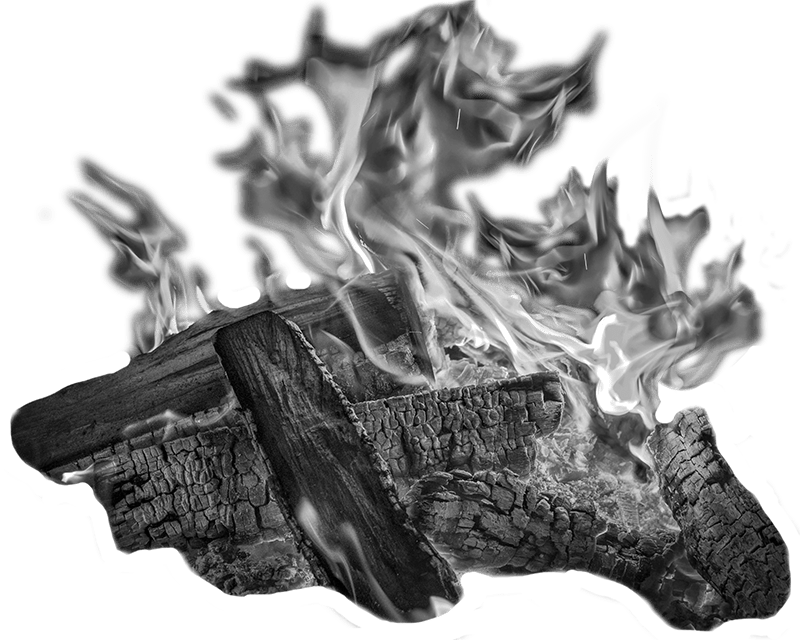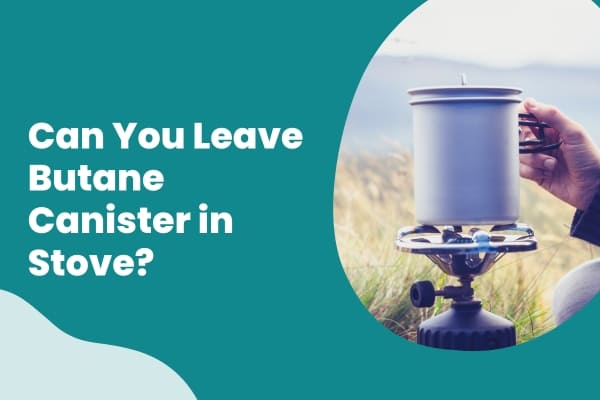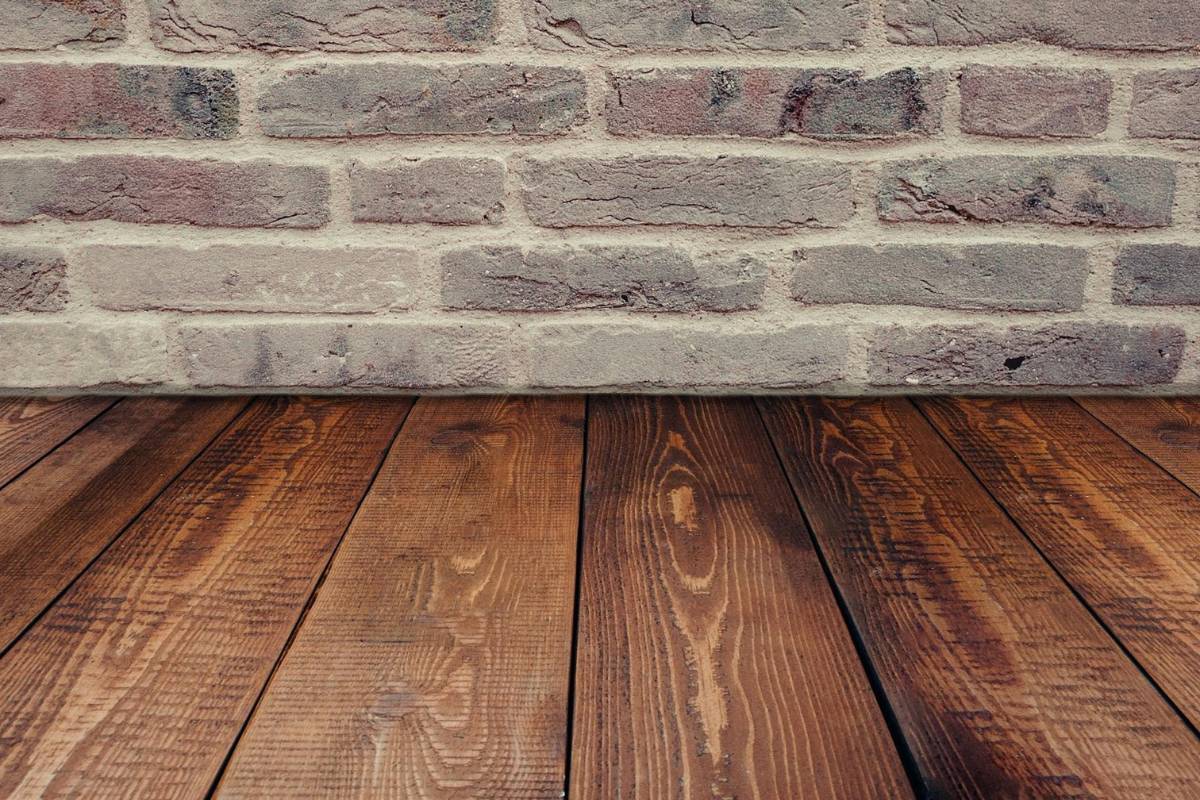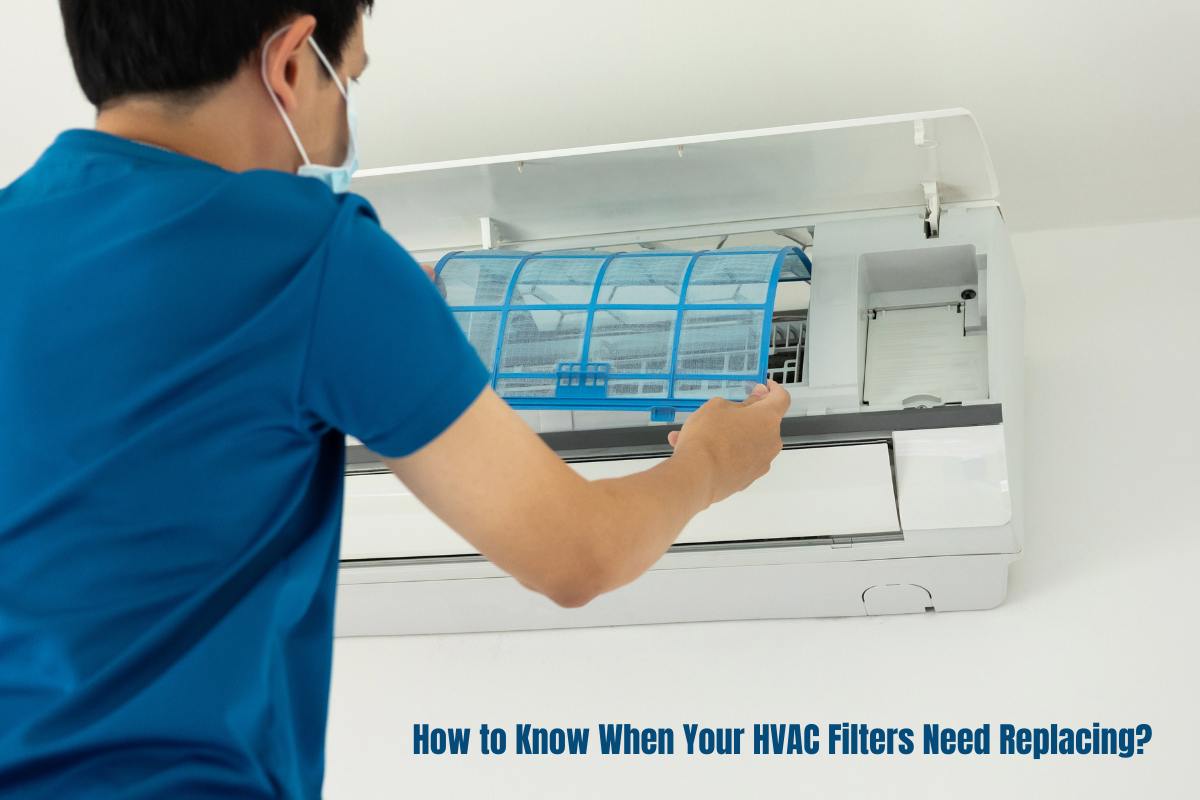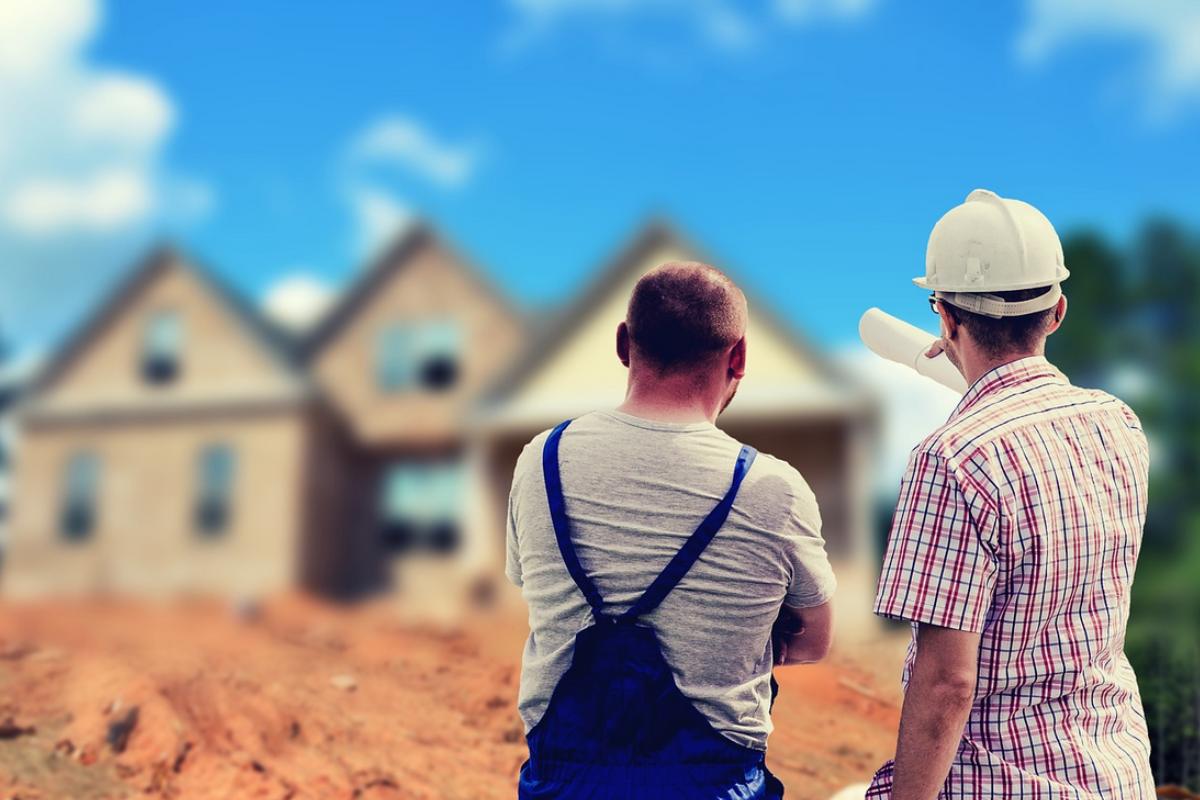Do you want to know whether you can safely leave a butane canister in your stove? You are in the right place! This article will teach you what to consider when leaving a butane canister on your stove.
Best practices for storing butane canisters in a stove will also be discussed. Additionally, you will find information on how long a butane canister will last in a stove.
With this information, you can make an informed decision and enjoy the freedom of knowing that you are safely storing your canisters.
Can You Leave Butane Canister in Stove?
Leaving a butane canister in a stove when not in use can be dangerous. Gas leaks, damage to the stove, and fire hazards can all occur due to overheating.
The risks are too great to ignore, so it’s important to take the time to remove the canister and store it safely when not in use.
Gas leaks
Leaving a butane canister in a stove can lead to gas leaks, which can be dangerous. Butane is an odorless gas, making it difficult to detect if the gas is leaking or not.
To avoid gas leakage, checking the valves regularly and ensuring they are closed when the stove is not in use is essential. Any small cracks or damage to the canister should be repaired immediately.
If you suspect a gas leak, turning off all gas valves and ventilating the area is important to reduce the risk of an explosion.
Lastly, it is essential to only store a butane canister in a stove for a short period. Storing it longer can increase the risk of gas leakage and create a hazardous environment.
Overheating
When a butane canister is left in a stove, it can cause overheating, which can be hazardous. Overheating can cause the canister to expand and burst, resulting in a pressure release. This can be dangerous as the pressure releases can cause fires or damage the stove and canister. Other risks include:
- Damage to the stove’s ignition system
- Warping of the canister due to heat
- An explosion of the canister due to pressure buildup
It is important to take extra precautions when using a butane canister in a stove. Never leave a canister on the stove while it is on; if it feels warm to the touch, it should be removed immediately.
Additionally, ensure the stove is kept in good condition and regularly inspected for any signs of damage or wear.
Fire hazards
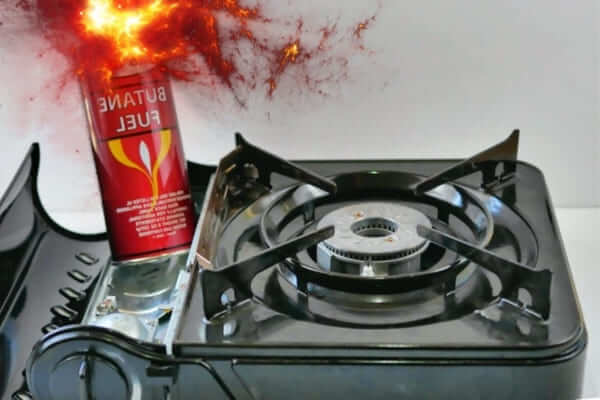
Placing a flammable item near a butane-fueled stove can create an increased risk of fire hazards. Gas burner explosions can occur if the stove is left unattended or the butane canister is not properly secured.
The fire risk is particularly high if there is a gas buildup in the area. Sparks from the stove can ignite the gas and cause an explosion.
Taking proper precautions when using a butane-fueled stove is essential to prevent an unintentional fire. Always keep flammable items away from the stove, and make sure the butane canister is securely fastened.
Monitor the stove carefully when used, and never leave it unattended. Following these safety protocols allows you to enjoy using a butane stove without worrying about potential fire hazards.
Damage to the stove
Leaving a flammable item near a gas-powered burner can cause damage to the stove. This is especially true regarding butane canisters, filled with an odorless gas. The consequences of leaving a canister in a stove can range from minor to severe, depending on the stove’s design and other factors.
Some risks of leaving a butane canister in a stove include:
- Poor stove ventilation: Without proper ventilation, the gas accumulates and can cause an explosion.
- Corrosion: The canister can corrode the venting system, leading to gas buildup.
- Fire hazards: If the gas accumulates, it can ignite and cause a dangerous fire.
Therefore, it is best to avoid leaving a butane canister on the stove, which can lead to serious consequences. It is important to exercise caution and use the stove safely to ensure the best possible outcome.
Factors to Consider When Leaving Butane Canister in Stove
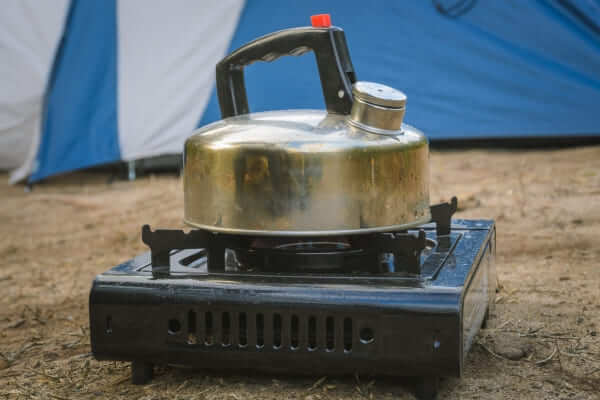
When considering leaving a butane canister in a stove, there are a few key factors. These include:
- The duration of storage
- The type of stove and canister
- The location
- The temperature
- Proper handling and usage
It is important to take the time to understand:
- How long the canister can be safely stored
- The best type of stove and canister to use
- The best location
- The ideal temperature
- Proper usage and handling of the canister
These key points will ensure the butane canister is safely stored and used.
Duration of storage
Storing a butane canister in a stove briefly requires following best practices. To ensure safety and maintain optimal performance, there are a few tips to consider:
–Safety Tips
- Check the canister for any leaks or damage before storage.
- Ensure the canister is securely connected to the stove, and all connections are tight.
- Ensure the butane canister is stored in a well-ventilated area away from heat sources.
–Maintenance Tips
- Regularly inspect the canister for any signs of corrosion or deterioration.
- Make sure the gas valve is closed when not in use.
- Store the canister in an upright position.
Type of stove and canister
It’s important to match the type of stove and canister to ensure proper use. Portable butane stoves and propane canisters have different specifications and requirements, so following the manufacturer’s instructions is important.
Portable butane stoves require canisters designed specifically for that type of stove. The canister must also be able to fit securely and be tightened properly.
Propane canisters must be approved for use with the particular stove, as they may not be compatible with all models. Additionally, it’s important to check the canister for any signs of wear and tear before using it. If the canister is damaged, it should not be used.
Following these steps will ensure the safe and effective use of the butane canister in the stove.
Location
It’s important to keep the canister away from any heat or flame when it comes to canister storage. To ensure your safety, here are three key things to remember:
- Don’t leave the canister on the stove. Gas leaks could occur if the canister is exposed to high temperatures.
- Keep the canister in a cool, dry place.
- Avoid enclosed spaces such as cupboards or drawers. Gas leaks may occur if the canister is not in an open area.
For your safety, do not leave your canister on the stove. Store it in a cool, dry place and avoid enclosed spaces to prevent gas leaks and potential fire hazards.
Temperature
Temperature is key when it comes to canister storage. Always ensure it’s kept at a moderate temperature for proper performance and maximum lifespan.
Extreme temperatures can lead to serious consequences, so it’s important to use intelligent and careful use when storing your canister. Avoid areas with extreme temperatures like the stove, and opt for closets or more temperature-controlled basements.
Using the stove as a storage location is not recommended, as the heat and flames can damage the canister and reduce its lifespan.
Keep your canister in a cool, dry place for best results.
Proper Handling and Usage
Always use the stove and canister carefully and follow the manufacturer’s instructions for safe and optimal performance.
Using an odorless gas such as butane for your stove and choosing an appropriate size canister for your specific needs is important for safe and efficient use. Check the manufacturer’s instructions for your stove and canister’s proper use, handling, and storage.
Always read the instruction manual carefully before using the stove and canister, and follow the safety guidelines provided.
Carefully inspect the canister for any signs of damage or leaks before each use. Also, keep the canister away from any open flames or hot surfaces.
Lastly, store the canister in a cool, dry place away from direct sunlight or heat when not in use.
How to Store Butane Canisters Safely [Best Tips]
When it comes to storing butane canisters in a stove, there are a few best practices you should follow.
First, it’s important to disconnect the canister when not in use.
Secondly, you should store the canister separately from the stove to prevent any potential accidents.
Finally, if you need to temporarily store the canister in the stove, take the necessary safety precautions.
By following these best practices, you can ensure your butane canister’s safe and efficient use.
Disconnecting the canister when not in use
It’s important to disconnect the canister when not in use. Storing a butane canister in a stove can lead to a dangerous situation if it is improperly handled. To prevent gas leaks and fire hazards, here are four essential tips:
- Check for design flaws: Inspect the canister and stove for any signs of damage or defects before using it.
- Secure the connection: Make sure the connection between the canister and the stove is tight to avoid gas leaks.
- Cap the valve: When the canister is not in use, cap the valve to prevent any gas from escaping.
- Disconnect: To be safe, it’s best to disconnect the canister from the stove when not in use.
Following these tips can help ensure the safety of your stove and its surroundings.
Storing the canister separately from the stove
Keep the canister away from the stove when not in use. Storing the canister separately from the stove is an important safety precaution to prevent damage to both the stove and the canister, which is flammable.
Storing the canister in a cool, dry, well-ventilated area, away from direct sunlight or other heat sources, is a good idea. Keep the canister away from other flammable items, such as matches, lighters, and candles.
Make sure the canister is securely stored in a place where it won’t be accidentally knocked over. Store the canister in an elevated position, such as on a shelf or in a cupboard, to prevent any potential damage from spills.
Taking these steps will help keep you and your surroundings safe.
Storing the canister in the stove for a short time
When storing the canister in the stove, following the manufacturer’s instructions and ensuring proper ventilation and temperature control is important. That means keeping the stove and canister away from direct heat sources, such as radiators or a hot oven. It also means ensuring the area is well-ventilated and the temperature does not exceed the recommended limit. Additionally, regularly inspect the canister for any signs of wear or damage.
By taking these steps, you’ll ensure the canister is safe and won’t be damaged while stored in the stove. However, the canister must be replaced after a certain period. Follow the manufacturer’s instructions for proper disposal.
How Long Will a Butane Canister Last in a Stove?
The lifespan of a butane canister in a stove varies depending on the size of the canister, the type of stove, and how often it’s used. Generally, a small canister lasts a few hours of continuous use, while a larger canister lasts several days or weeks.
To ensure safe and efficient use, following manufacturer instructions and monitoring the canister’s level is important. Make sure to replace any canister that is leaking or has been depleted. Avoid overfilling it, and keep the flame low to conserve fuel.
With proper care, a butane canister will last as long as it should in your stove.
Conclusion
You can leave a butane canister on a stove, but it’s important to be aware of the risks.
Make sure to store it in a safe place, away from any heat sources, and be sure to check it periodically for any leaks or damage.
If you follow the best practices for storing and using butane canisters, you should be able to get the most out of them and keep them safe for a long time.
